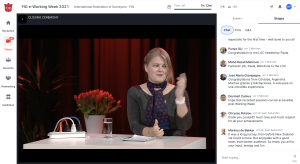News in 2021

|
FIG e-Working Week 2021 - report
20-25 June 2021, online + Apeldoorn the Netherlands
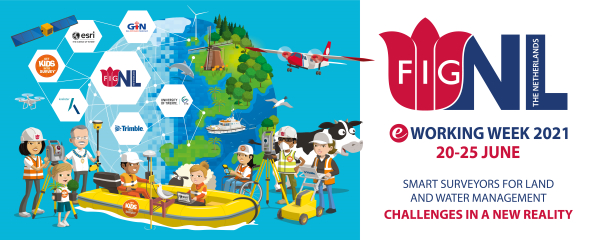
Well, now we have also tried this. A fully online event - well almost
fully online. The only who could meet in person were some from the local
organisers (not all in order to be able to keep the corona-distance) as
well as FIG President Rudolf Staiger and Director Louise Friis-Hansen
who travelled to Apeldoorn from Germany and Denmark. A tech-hub with
local helpers was installed at a hotel in Apeldoorn. FIG General
Assembly and keynote sessions were run from a studio i Apeldoorn (the
home town of Dutch Kadaster). Another tech-hub
was the FIG Office in Copenhagen with Claudia Stormoen and Maria
Bargholz.
On top of this there were 1301 participants sitting in front of
their computers, tablets, phones - at home, in their office, outside - a
speaker was even talking from her car. All with the common purpose to
attend in the over 80 sessions and other activities that took place
during these 6 packed days. These 1301 participants came from in total
110 countries.
All who attended recall the banner picture shown at the top of this
page, prepared by Get Kids into
Survey. FIG and the Dutch local organisers thank
Get Kids
into Survey very much for this wonderful drawing. It captures this virtual
and special event - with the half digital globe, Dutch
elements, FIG President, main partners and sponsors and other surveying
elements. This drawing will be a very nice way to remember this
different e-Working Week. FIG and the local organisers appreciated the
cooperation with Get Kids into Survey an hope to establish contact
between GKIS and our national members. For that reason GKIS was invited
to attend the Member Association and Regional Bodies Forum.
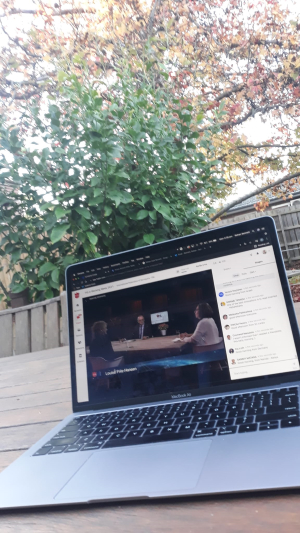
Watching the opening - from anywhere |
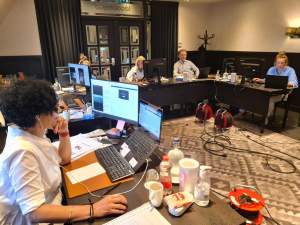
Tech-hub in Apeldoorn with local organisers
|
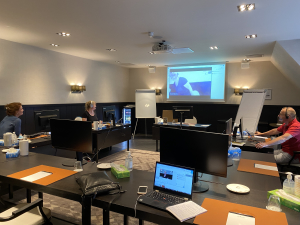
Paula Dijkstra, Martine Eelderink and Rudolf Staiger in the
Apeldoorn tech hub
|
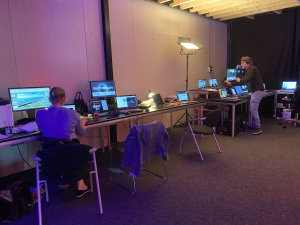
Studio - backend
|
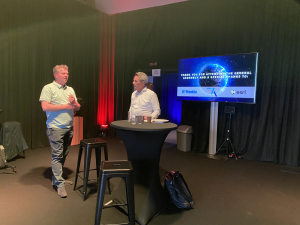
Frank Tierolff and Kees de Zeeuv, Kadaster, in the back room of
the studio on Apeldoorn
|
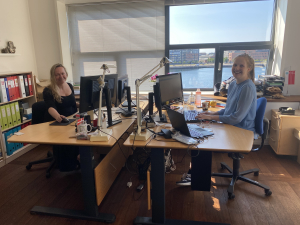 |
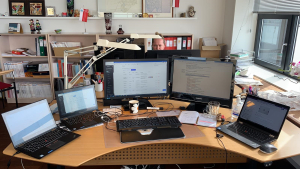
The FIG Office tech-hub with Claudia Stormoen and Maria
Bargholz - and a number of screens
|
A different concept
An online confrerence differs very much from a face-to-face event and
therefore much effort was done to create and event that would work
virtually instead of converting the usual on-site elements. The conference
consisted of:
The conference spirit
It was important for FIG and the Dutch local organisers to not "just"
organise some sessions - but instead give a full conference feeling and
to feel part of the surveying community. This spirit is however not that
easy to create - especially online.
|
The comments in the
chats and also our post survey show clearly that an online event is not the same as to
meet in person. There are also many challenges such as time difference
(there is no time that is good for all!) and to keep an open
calendar and not fill in other activities at the same time. On the other
hand, online events also have some opportunities especially for those
who are not normally able to travel to a destination. The current
situation, however, forced us to either connect online or
cancel, and we are very pleased that the Dutch organisers stayed
on board and did a very big and successful effort to bring in
this conference and community spirit to this online event. |
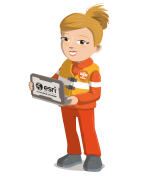 |
The time difference was an will always be a challenge. The programme
had sessions and activities spread over the day - and since the local
organisers was from the Netherlands, all timing was kept in Central
European Summer time. Although there were early morning sessions and
late evening sessions (Central European time) there are always time that
is convenient for some and not for others. The second-best solution is
recordings of sessions, and participants have access to the recordings.
Various networking opportunities were offered. Many of the 1301
attendees managed to find out both how to network randomly and also to
organise small meetings with up to 5 in a chat room. The random
networking feature was a replace of the "coffee-line chats" - the small-talk
that takes place while waiting in line for your coffee/tea. Each
participate could enter this networking environment and be randomly
brought together with another participant for a 3-minute talk. The
system made sure that each time participants would be paired with a new
partner. This 3-minute talk could be prolonged if both parties agreed to
it. In the breaks there were also different activities to bring
attendees together such as "break sessions" with a specific topic, the
AMA sessions (see below), and the students from ITC had
made a quiz - and these quiz sessions were very well attended.
AMA sessions
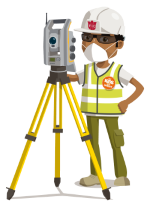
|
A new feature that was introduced were the AMA sessions... the Ask Me
Anything sessions. They were organised right after most of the ordinary
sessions (in the breaks) and were meant to serve as a room where it would be possible
for participants to have an extra chat with the speakers, ask further
questions, and it was also a place for authors who were connected to a
session to meet and discuss. At face-to-face events there are always
some participants who want an extra chat with the speakers and with
other participants and this was
our interpretation of how this could be done in a virtual environment.
It was a new concept, and along the week the attendees got used to this
extra opportunity (although placed during the breaks). In the
post-survey many found these AMA sessions useful and good. |
Opening session
How do you make a grand opening - online... Well, the FIG Fanfare was
a recognizable element. In the General Assembly the FIG Fanfare was
played while a picture-show from previous General Assemblies took the
participants down memory lane. At the Opening Session, the Fanfare was
accompanied by a count-down video created by the local organisers,
counting each second with various colourful photos of all the more than
30 local persons who have been involved in the organisation of the event
- counting
down each second with finger signs.
Invited to the studio were the partners of this e-Working Week, who
are at the same time the Dutch members of FIG, Ron Rozema, President of
GIN, the national association of surveyors, Frank Tierolff, Chair of the
Executive Board, Kadaster and Freek van der Meer, Dean at ITC,
University of Twente. A video greeting was provided by the official
representative of the Ministry of the Interior Maarten Schurink. Hereto,
Durk Haarma from Geomares, the fourth Dutch member of FIG, had prepared
and conducted special video interviews with Mr Arnold Bregt, Dean of
Education and profession of Geo-Information Science at the Wageningen
University and at the same time chairman of the Netherlands Centre of
Geodesy and Geo-Informatics.
|
At the end of the welcome address each
speaker was asked to plug in a cord with the four Dutch colours: orange,
red, white and blue, and at the end Co-Conference Director Paula
Dijkstra turned on the switch to mark the opening of the conference. |
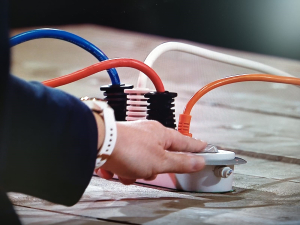 |
Keynote sessions
Seven keynote sessions were organised during the three conference day
and one workshop day.
The keynote sessions differend in their format from the more
traditional plenary sessions at face-to-face meetings where often three
plenary speakers are invited for a presentation. The keynote sessions
were of 1-hour duration - followed by an AMA session, and were based on
seven different and current topics with either a panel discussion or
interview-style format and adapted to the online format.
The seven keynote sessions had the following topics:
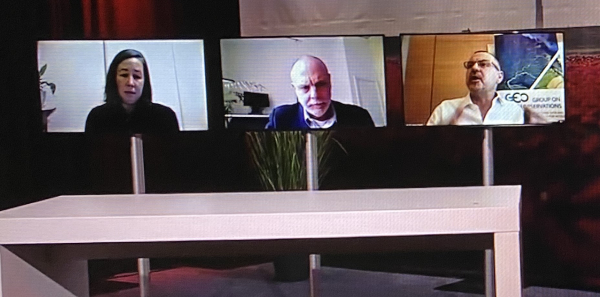
The Impact of COVID 19 on the Profession with Benjamin
Davis, FAO, Steven Ramage,
GEO and Léa Bodossian, Eurogeographics
(not in the picture), chaired by Kate Fairlie
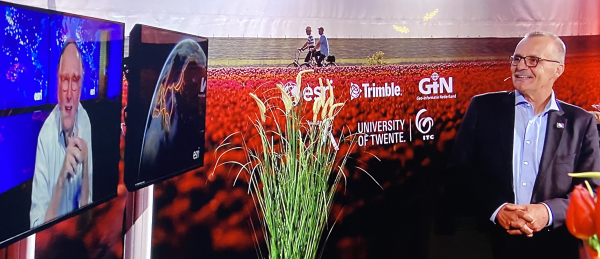 The Challenges for Smart Surveyors in a New Reality with
Founder and President of Esri - Environmental Systems Research
Institute, Jack Dangermond, in conversation with
FIG President Rudolf Staiger
The Challenges for Smart Surveyors in a New Reality with
Founder and President of Esri - Environmental Systems Research
Institute, Jack Dangermond, in conversation with
FIG President Rudolf Staiger


Fit-for-Purpose 2021 - Ten years of FFP: lessons learned
and what now? with Emmanuel
Nkurunziza, RCMRD, Stig Enemark,
FIG Honorary President, and Professor emeritus, and Amy
Coughenour, Cadasta Foundation, moderated by Jaap
Zevenbergen and Mila Koeva, ITC
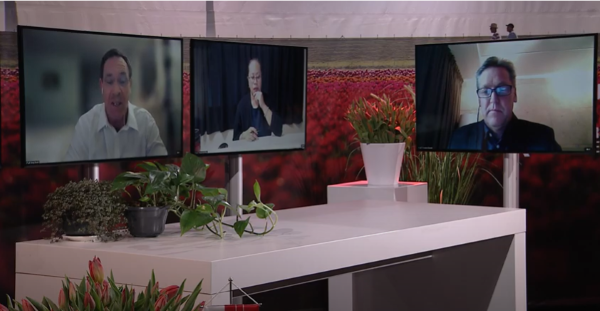
Integrated geospatial information for transformational
change with Greg Scott,
UN-GGIM and Rosamond Carter Bing,
Co-Chair of the Extended Bureau of UN-GGIM and moderator Anders
Sandin, the Swedish mapping cadastral and mapping authority
 Making the land and property sector sustainable and
resilient: Ensuring Diversity and Inclusion moderated
by FIG Vice President Diane Dumashie with Narelle
Underwood, Surveyor General of NSW, Australia, Chitra
Weddikkera, Dean of Colombo School of Construction
Technology, Paul Olomolaiye, Pro
Vice-Chancellor Univercity of the West of England and Victoria
Stanley, Senior Land Administration Specialist (not in the
picture)
Making the land and property sector sustainable and
resilient: Ensuring Diversity and Inclusion moderated
by FIG Vice President Diane Dumashie with Narelle
Underwood, Surveyor General of NSW, Australia, Chitra
Weddikkera, Dean of Colombo School of Construction
Technology, Paul Olomolaiye, Pro
Vice-Chancellor Univercity of the West of England and Victoria
Stanley, Senior Land Administration Specialist (not in the
picture)
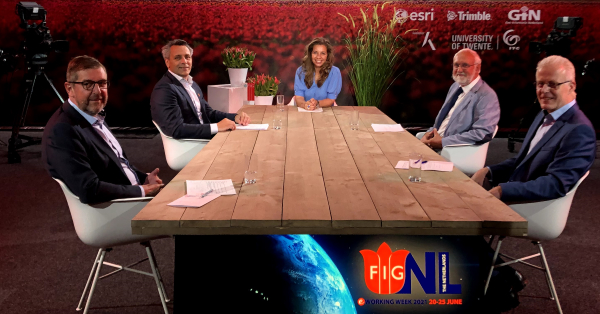
Digital Twins | How can DT support legal security? with Frank
Tierolff, Netherlands Kadaster, Sisi
Zlatanova, UNSW Sydney (not in the
picture), Noud
Hooyman, Chief Geo-information Officer Directorate for
Spatial Planning Ministry of the Interior and Kingdom Relations
Netherlands and Henk Scholten, Director Research and Innovations
Geodan Netherlands

Success - a Continuous Journey - how about your journey? Co-conference
directors Paula Dijkstra and Louise
Friis-Hansen talked with Chief Success officer
at Bentley Katriona Lord-Levins
on how to tacle your own situation successfully.
You can watch or re-watch the keynote sessions in the FIG Article of the
Month series during the coming months.
This following wonderful drawing
which was created by Sophie Druif includes a summary of some of the
keynote sessions. The drawing came as a surprise and was reveiled
at the Closing Ceremony - please check out the many details...
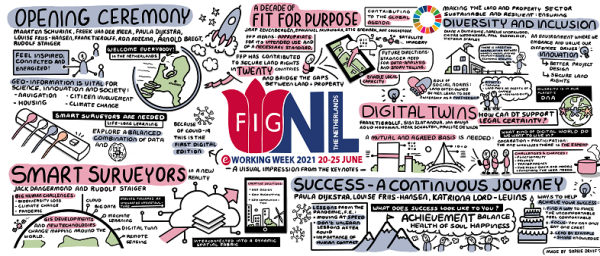
Click on the picture to see it in bigger format
Sponsor booths and sessions
An online platform called Hopin was used for the e-Working Week. This
platform was selected because it had the opportunity of other features than
sessions to bring in a more complete conference feeling. One of these
features was a sponsor area, called expo where all sponsors could
showcase themselves.
It is thanks to these sponsors and
partners that the conference could take place. A very big thanks to all
sponsors.
The sponsor booths could have been visited more frequently by
participants. We knew however that this is a challenge online, so
therefore some sponsors were also offered sessions in the
programme, and these sessions attracted a good number of participants.
Please thank all these sponsors and partners for their cooperation:

Institutional partners
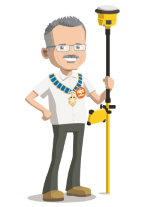 |
FIG works together with several institutional partners, and it
is important for FIG to serve as a link between the
institutional partners and country level activities. FIG
operates at an international level, assisting with the creation
of tools, reports and knowledge that can be used at a regional
and national level. It is therefore also important for FIG that
institutional partners are connected to the FIG conferences to
establish these important links and to give a platform to
exchange information and to bring experts together e.g. in
sessions and workshops. |
A high-level and currently very relevant session was jointly
organised by FAO, FIG, UNSD/UN-GGIM, UNECE and World Bank
onThe Role of the Geospatial Information in Responding to Crises and
Accelerating the Progress on Achieving the SDGs. This session aimed to
discuss the role of the geospatial information in responding to covid-19
pandemic and to share good practices for using geospatial information to
better respond to future crises and to accelerate the progress on the
achieving the SDGs.
FAO also organised three other sessions. One on Fit for
Purpose (FFP) for Land and Water Management –The Relationship of the
Water and Land Tenure Nexus on the role of participatory mapping
experiences using FFP technologies such as Open Tenure (OT) in
programmes and projects in cooperation with FIG Commission 8. A session
on The Role of Land Banking in Support of Land Consolidation and finally
in the book-corner presenting the book: Real Estate Registration and
Cadastre. Practical Lessons and Experiences (more
information about the book)
Two sessions were organised in cooperation with UN-Habitat/GLTN
(Global Land Tool Network) on the two activities that FIG has been
involved in: Urban Rural Land Linkages (URLL) where a report was
launched, and the Valuation of Unregistered Land, launching a manual.
UN-GGIM was also involved in several sessions Apart from the
keynote session on IGIF - Integrated Geospatial Information for
Transformational Change that explained what IGIF is and the use of it
there was also a high-level session on IGIF at the Country-Level
focusing on the needed steps and actions by member states for the
implementation of IGIF.
The UN-GGIM Framework for Effective Land Administration (FELA) was
also the topic of a session giving an insight in what FELA is and to
have an open discussion on the uptake of the framework in the FIG
community, a communication plan and to share first ideas on
implementations and use cases. Also a session on Coordination of Global
to Regional Geodetic Efforts through the United Nations was organised in
cooperation with FIG commission 2 and 5.
Sessions
| Much work had been done to create and design sessions that would work
to an online concept. What works well online are interviews, dialogs,
panel discussions etc that gives a more dynamic session. It was nice to
see that many sessions were well visited. One challenge of an online
worldwide event is how to deal with different time zones. And it is a
recurrent challenge with no real solution. There is no time that is good
for all. There were however good attendance - also from some brave
spirits who attended during their night time. With no travel there
should be no jet-lag, but there was certainly some odd hours in front of
the computer... There was really an amazing spirit. |
 |
Sessions were scattered over quite many hours during the day. The
online system made it easier to move from one session to another than
had it been at an event in a conference centre, and it can be seen that
quite many used this opportunity to jump between several parallel
sessions.
A big thanks to all attendees and speakers for taking up the
challenge with these online session - it was different, but hopefully
still inspiring in a different way.
In total 335 abstracts were accepted. Only few of these were upgrated
to present in a session. All authors were given the option to produce a
video presentation which is published in the proceedings together with
the full papers. All abstracts were connected to a session and was used
for reference material and the authors also had a role in the AMA
(ask-me-anything) sessions after the actual session.
All attendees had the possibility to see recordings of the sessions -
not the same as real-time, but hopefully still useful. The sessions are
also included in the e-conference bag that has been sent to all
participants.
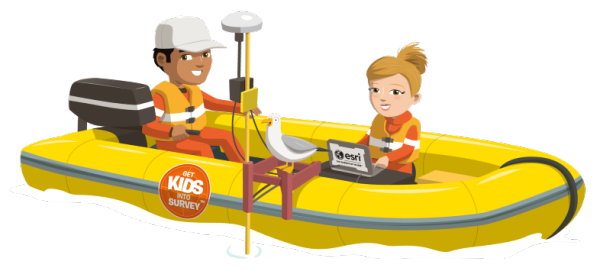 Workshops
Workshops
At FIG events often several pre-workshops and seminars are
offered. Online, a full day in the technical programme was dedicated to
a quite big number of workshops. These workshop were well attended and seemed to be a successful feature.
The workshops spanned over quite many different topics :
- The ArcGIS Parcel Fabric – Modern Solution for Land
Administration
- 50 High-Resolution Laser Scans/Hour – Workflow Description of
Extensive TLS Projects with a RIEGL VZ-400i Laser Scanner
- 9th FIG Workshop on the Land Administration Domain Model / 3D
Land Administration
- Decade of FFPLA: Key Lessons and Future Directions
- Surveying and BIM Classroom
- Augmented Reality in the Construction World
- Generic Tool for Land Consolidation
- Blended Learning: lessons from our responses to COVID-19
- Workshop on e-Volunteering to Address Environmental Challenges -
A Real-life Example with a Real-time Project
Read more about the workshops
6th Young Surveyors Event
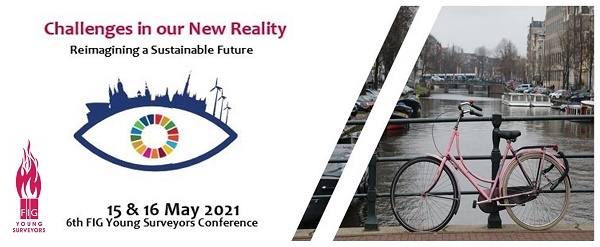
The Young Surveyors event took place one month before the e-Working
Week, on 15-16 May 2021. The 6YSCe was held in four regional programmes
covering the Africa and European Region, the South American Region, the
North American Region, and the Asia and the Pacific Region. Each
programme comprised a keynote session, two parallel sessions, which
included panel discussions and presentations, as well as a plenary
interactive session. In total, the conference brought together about 300
young surveyors from around the world into four
regional programmes, which focused on two broad streams - sustainablity
and professional development. The 6YSC provided young surveyors a unique
insight into the future of the surveying profession, the future of
technology, as well as sustainable development all within the context of
the challenges of the current day. This report outlines what transpired
in the the two day conference.
Closing
After the final two General Assembly sessions on 25 June which
concentrated on FIG Governance and the Work of FIG (read
more about the General Assembly here) it was time to close the
e-Working Week 2021. Six full days with a packed programme came to an
end.
In his closing speech FIG President Rudolf Staiger wrapped up the
activities during the week, the cooperations with the institutional
partners with a special thanks to them for their cooperation, to the
invaluable sponsors of the event and also all the participants who chose
to spend a week in the company of FIG - despite the distance.
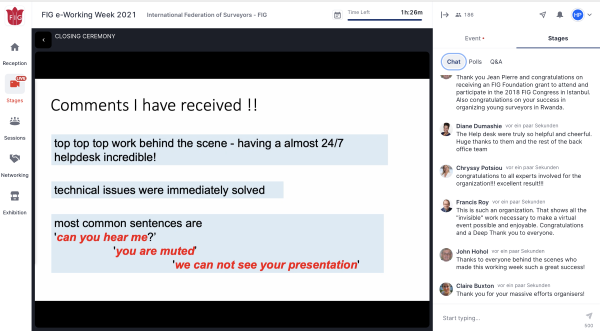
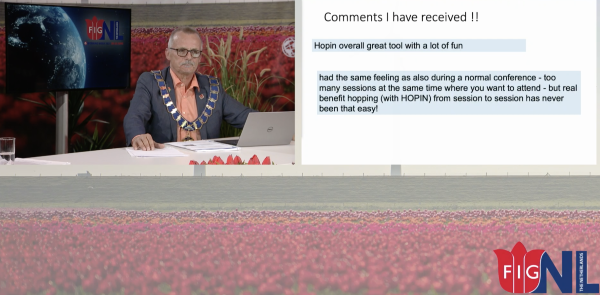
After the closing speech FIG President Rudolf Staiger invited the
co-conference directors, Paula Dijkstra and Louise Friis-Hansen to a
short wrap-up and reflection of this different format of a working week.
Finally - and it is important to keep some traditions with these many
new features, Brent Jones, ESRI, had agreed on behalf of the sponsors
and corporate members of FIG to make his evaluation of the e-Working
Week which was done by a score of tulips. He did this with his usual
insight and humor, and with his orange tie... Thanks Brent for doing
this. We cannot help your coffee and chair, but we agree with your
tulip-votes.


The local organisers need a very big thank you. They agreed to take up
this challenge - on unknown ground - to explore together with FIG, to
set up goals and achieve (most of) them, to create more than "just" a
conference. Together with many FIG volunteers a relevant programme was
brought together with relevant sessions that were fitted to a virtual
environment. A lot of work, and more work than for a normal Working
Week. Thanks also to all these many people who have contributed to the
content of the conference.
We do want to share this last slide by Brent Jones - and agree with the
number of tulips to give to the local organisers from the Netherlands.
They did an amazing job to make this different event come through with
all its unknown factors and elements. They took up this challenge with
an enormous spirit, energy and drive.
THANK YOU!

Once the closing was over a small number of the local organisers had
gathered outside the studio:
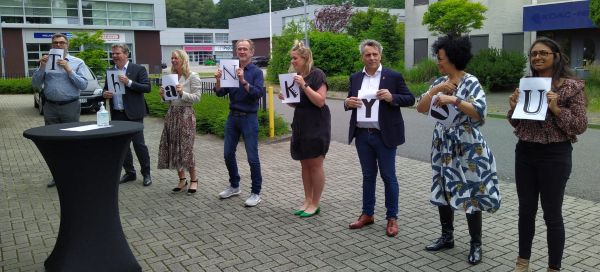
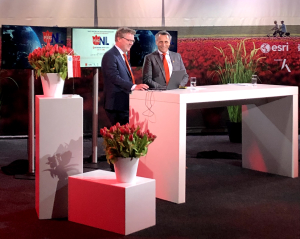
Kees de Zeeuv and Frank Tierolff, Kadaster, with a final goodbye
to the studio. |

All members of the local organising committee need a proper and
sincere THANK YOU. This was received by Paula Dijkstra on behalf
of everyone. |

Relevant links:
Post survey result:
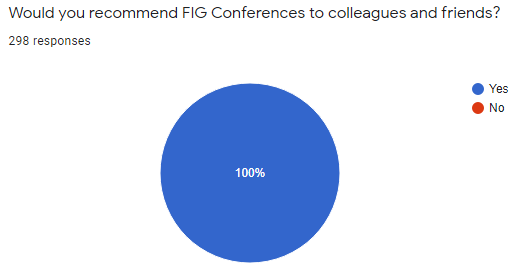
Louise Friis-Hansen
July 2021

































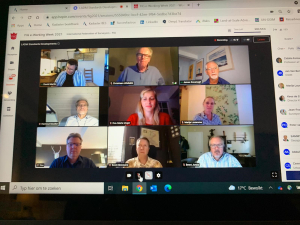
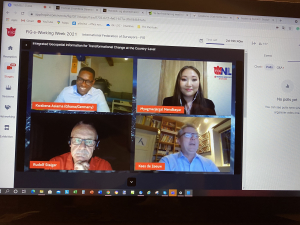


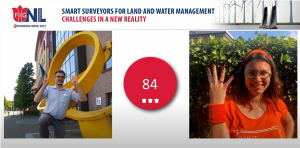
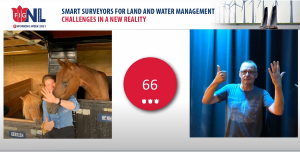
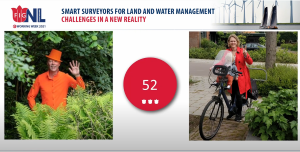
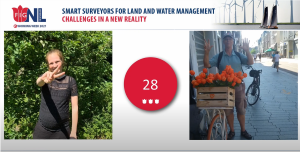

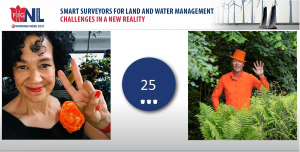

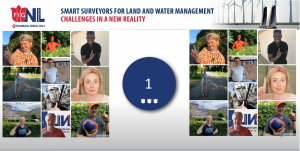
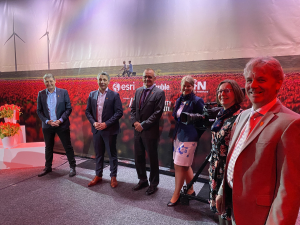



 The Challenges for Smart Surveyors in a New Reality
The Challenges for Smart Surveyors in a New Reality


 Making the land and property sector sustainable and
resilient: Ensuring Diversity and Inclusion
Making the land and property sector sustainable and
resilient: Ensuring Diversity and Inclusion





 Workshops
Workshops



